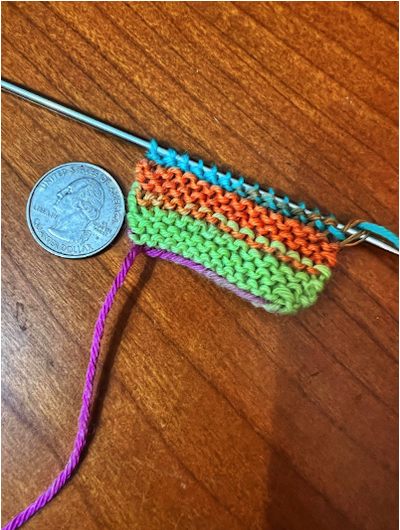What are Your 12 Fundamental Problems?

This week, Feliks and I reunited with our beloved knitting teacher, Miss Roberta, for a new class about knitting socks on two circular needles. Need I say I am flailing in the deep end? And that the little bit in the photo above took me HOURS because I had to start over several times?
Here’s what you must know about Miss Roberta. She is 80 and has been knitting for 70 years or more.
She was our knitting teacher last year and is originally from New York, so can be blunter than, say, a Southern knitting teacher.
We went to the yarn shop where she works to make sure we had the right yarn and needles for our next class with her that starts Monday. It is a two-needle sock-knitting class.
Miss Roberta: “This is what you’ll need for the class. Have you been knitting since the last class?”
<Patti and Feliks look down at the ground>
Miss Roberta: “I see. So you will absolutely need to practice casting on and knitting this weekend. You don’t want to start on Monday without practicing this weekend.”
Patti and Feliks: “Yes, Miss Roberta.”
Miss Roberta: “You’ll also have to knit between the weekly classes because no matter how long your sock is in week 2, we’re going to knit the heel. So if you only knit one inch between classes, your sock is going to be one-inch long.”
<Patti envisions her one-inch sock>
Patti and Feliks: “Yes, Miss Roberta.”
We love her.
Keeping my brain agile and flexible while aging has long been an interest of mine, having seen the impact of dementia on all the older women in my family. To stave it off, in the past few years, I have taken fiddle and mandolin lessons, knitting and weaving lessons, American Sign Language, Spanish language classes, online writing classes, and more. I read voraciously and always have. I do the NYTimes crossword puzzle and Wordle daily. I love a challenge and hope that these challenges are keeping the synapses in my brain moving quickly and often. Perhaps my future still involves dementia, but I’ll have had fun (and learned a lot) in trying to stave that off.
One class I took this past weekend was an online course with author Oliver Burkeman on Designing Systems for Creativity. He is the author of two books I’ve read recently, Four Thousand Weeks and The Antidote.
One takeaway (among many) was physicist Richard Feynman’s idea of “Twelve Fundamental Problems.” Feynman identified twelve problems he was interested in or working on and kept notes from his reading and thinking in links under each category so he could chunk them into their rightful place to one of the fundamental problems on which he was noodling.
I decided to create my list of 12 Fundamental Problems to see how that might work for me. It was fascinating to elucidate the 12 Fundamental Problems and to recognize that while some of these problems were dormant and in the back of my mind, they formed a good foundation for gathering information as I read and experienced things in the world around me. Here is the draft of my list to give you an idea:
- What are some of the key organizing themes in my novel?
- What are some juicy, small ideas for my Orange Desk newsletter?
- What are some big ideas for (one of my clients’) DE&I Initiative?
- What can I contribute to the DE&I field that will be helpful and move the conversation forward?
- How can Camp be more successful and fun?
- How can I be more healthy and flexible as I age (mentally and physically)?
- What should I stop doing?
- What do I need to do to have an organized and beautiful home?
- How can I best help Emma and Feliks thrive in their lives?
- What is the role of “place” in our lives?
- In what ways do science and art overlap?
- What is the nature of friendship?
As I read things that will help me address those “problems,” I am adding a link under the appropriate category for easy reference when I dive in to address them more deeply. Just coming up with the problems was illuminating. Perhaps this will be helpful to you.
As Carl Rogers said, “The only person who is educated is the one who has learned how to learn and change.”
What are you learning? What are your 12 fundamental problems?









